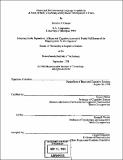Genes and environment in language acquisition : a study of early vocabulary and syntactic development in twins
Author(s)
Ganger, Jennifer B
DownloadFull printable version (13.78Mb)
Advisor
Steven Pinker and Kenneth Wexler.
Terms of use
Metadata
Show full item recordAbstract
The goal of this thesis is to explore the contributions of heredity and environment to language development using the twin method. This method consists of comparing monozygotic (MZ) twins to dizygotic (DZ) twins to see if MZs have a more similar course of development. Two major aspects of language development are examined: vocabulary and syntax. The development of vocabulary in 43 MZ and 33 same-sex DZ English-speaking twins was studied via parent report. The rate and content of the first 100 or so words in children's productive vocabularies were examined. MZ twins had more similar ages at reaching several milestones of vocabulary growth, more similar overall rates of vocabulary growth, more similar spurts in vocabulary growth, and more similarity in actual words and categories of words they produced than DZ twins, suggesting heritability in early word learning. However, the effects of environment were also prominent in vocabulary development, dwarfing effects of heritability. The development of first word combinations and of first over regularizations of the past tense rule "add -ed'' (e.g., goed for went) were also studied by parent report to examine the contributions of heredity and environment to the development of syntax. Both the age of producing first word combinations and the rate of producing combinations were much more similar in MZ than in DZ twins (N = 24 MZ, 23 DZ). This effect showed large heritability and small effects of environment. The rate of producing past tense over regularizations also appeared to be more similar in MZ than in DZ twins, though this result is tentative due to the small number of twins in this study ( 16 MZ, 11 DZ). Finally, the development of verb tense and agreement was studied longitudinally in 4 MZ and 4 DZ twin pairs. The percentage of correct use of tense/agreement morphemes over time was on average more correlated in the MZ than in the DZ twins, suggesting that differences in the development of the Inflectional system also have genetic influence.
Description
Thesis (Ph.D.)--Massachusetts Institute of Technology, Dept. of Brain and Cognitive Sciences, 1998. Includes bibliographical references (p. 163-168).
Date issued
1998Department
Massachusetts Institute of Technology. Department of Brain and Cognitive SciencesPublisher
Massachusetts Institute of Technology
Keywords
Brain and Cognitive Sciences